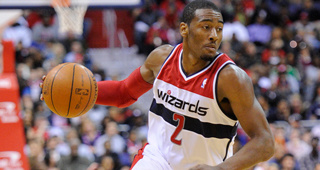Considering how much ink gets spilled on NBA personnel moves, it seems difficult to imagine that building an elite team can be simple. Amazingly enough, all of the bluster and hang-wringing comes down to exactly one thing: the presence of an MVP-caliber player. My absolute favorite stat in the NBA is that the last non-Pistons championship team without a player who had already won a regular season Most Valuable Player award was the 1981 Celtics who had Larry Bird. Look at that again- it does not include any players who got a bump in notoriety after winning their first title. Considering the fact that there are only two players in the NBA under the age of 34 with an MVP under their belt, this figure will either be tested or confirmed in a big way over the next few seasons.
This statistic dovetails with another pivotal point when analyzing teams: acquiring and securing elite talent trumps all other concerns. One of the ways I think about this question is to pick out the clear-cut “10’s” in the NBA at any given time. Not all of these players are created equal and the amount of transcendent players has never been consistent over time. As I see it now, the league only has three inarguable 10’s: LeBron James, Kevin Durant and Chris Paul. Other players are close but that stands as the full and complete list at this moment in time.
Since these players hold such disproportionate value in a league with both a team salary cap and individual max salaries, they hold the cards to championships moving forward. Their current teams must focus on retaining them while every other organization who possesses winning a championship as their goal must try to either acquire one of the current 10’s or look to identify and develop a new one. This is where John Wall fits in.
Many people, including myself, have written on the point guard renaissance currently afoot in the NBA. A new breed of athletic point guards have come into the league quickly and made a major impact even as they adjust to the higher level of competition. This group also stands out because each potentially elite point brings his own strengths and weaknesses to the table. For example, Russell Westbrook has the athleticism but often gets in his own way while Derrick Rose has put it together but we still wonder about how his injury will affect him beyond this season. The same applies to other young primary ballhandlers like Kyrie Irving, Rajon Rondo, Ricky Rubio and Stephen Curry.
Since he was in high school, draftniks have wondered whether John Wall could put it together enough to make the biggest leap of all. His Achilles’ heel has been perimeter shooting, which plays an even larger role now due to the league’s emphasis on spacing. We have seen what happens to creators who cannot shoot and the results have not been particularly pretty. After battling back from his left knee injury, Wall has exploded onto the national scene the last few weeks averaging 23.8 points and 9 assists in his last ten games. More important than the front-line statistics has been the reasons why they have improved. In his nineteen games after the All-Star break, Wall has shot 47.8 percent from the field, 50 percent from three, and 85 percent from the free throw line. More remarkably, he has not dramatically shifted his attempts per game in any of those three categories since the break- only the amount of made shots has changed. Keeping that scoring efficiency up would put him in rarified air among perimeter players in the league: only LeBron James, Dwyane Wade, and Kevin Durant have put up numbers similar to that this year while carrying a meaningful level of the scoring load for their teams.
On top of that, Wall would become the first of the elite athletic point guards to correct his most glaring weakness. After Monday’s exhibition with a depleted roster (Nene, Bradley Beal, Martell Webster and Trevor Ariza all missed the game), both Wall and coach Randy Wittman talked about the time John had taken over the summer to work on his shot before getting sidetracked by his injury. In fact, Wittman noted that Wall was just now getting into “game shape” because the knee injury forced Wall to basically sit for three and a half months. He has the vision and ability as a passer to be both a “pure point guard” and more of a scorer’s game, making him a potential best of both worlds primary ballhandler. That combination of skills also makes a ton of sense next to Bradley Beal and we have already seen how Wall’s presence has helped both Beal and Emeka Okafor on the offensive end.
Over the same period of time, media members have started to discuss whether John Wall is worthy of a max extension.
The main question here has to be whether John is worthy of the “Eric Gordon max” meaning the highest amount a new team can offer a Restricted Free Agent coming off his rookie deal. It seems like an inevitability now that as long as Wall stays on the court someone will offer him this contract, so the Wizards might as well decide if they would match it. To me, Wall has already shown enough to make him worth that kind of contract. However, he needs to continue his remarkable play for longer than this in order to become the “designated player” (allowing Washington to offer him a fifth year) or necessitate taking the risk of signing him now rather than waiting to match like the Hornets did with Gordon. I had similar concerns about Stephen Curry but we will have to see if Wall would be willing to take a similar contract rather than waiting for 2014. Unless the Wizards are scared their best player will take the qualifying offer and then become unrestricted in 2015, they can negotiate from a position of strength now coupled with the knowledge that they need to be ready to make the right move in 2014 if Wall will not take less now for the security. Either way, it would be catastrophic for a franchise that has not wooed a ton of high-level talent to lose someone like John Wall. He is remarkable right now and has so much room to grow as a player and force in the league. As has become blatantly clear now, any team, particularly an organization like the Wizards, cannot afford to let a potential 10 slip through their grasp.



